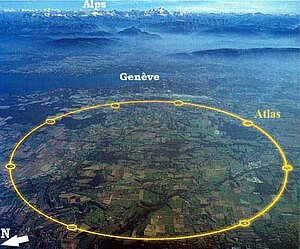Particle physics
On the North Campus close to the cafeteria, we study the Standard Model of particle physics. This model describes our current understanding of the building blocks of matter and their interactions. In experimental particle physics, the Standard Model is being tested with ever-increasing precision, for example, through the ATLAS experiment, in which we are involved. ATLAS is the largest universal detector at the Large Hadron Collider (LHC), which works with proton-proton collisions.
Our group contributes to the further development of the detectors, their understanding and operation, as well as to the data analyses using the ATLAS detector data stored in the Worldwide grid and the CERN computing resources. The necessary algorithms and workflows are developed in collaboration with the international working groups and the work is shared among the collaborators. For Bachelor's and Master's theses, some tasks can also be divided into sub-level investigations, so that useful contributions to data analysis can be made with this work.
The data analyses at Würzburg to test the Standard Model focus on the W boson mass measurement, investigating processes involving top quarks or testing the electroweak gauge theory using scattering processes between gauge bosons (W, Z and photon).
ATLAS detector at the LHC

Protons have been accelerated to the centre-of-mass energies of 8 TeV and above at the Large Hadron Collider (LHC) at CERN since 2012. Since the new upgrade, the LHC has been running with a centre-of-mass energy of almost 14 GeV. This is a new world record for the collision of proton beams! The high energies at the collision points are similar to the conditions that prevailed in the universe fractions of a second after the Big Bang.
The ATLAS detector at the LHC investigates the underlying physical processes. More than 2000 scientists and engineers from more than 150 Institutes worldwide are involved in this large-scale experiment as part of the ATLAS collaboration. Since July 2008, the "Experimental Particle Physics" group at the Department of Physics and its Didactics has also been a member of the ATLAS collaboration. One of the most important goals of ATLAS is the understanding of particle masses. Other important programs include the study of top physics, the search for Supersymmetric particles and the search for New Physics beyond the Standard Model of elementary particle physics. One of the highly acclaimed successes of the analysis of ATLAS data to date is the discovery of the Higgs boson together with the CMS experiment on 4 July 2012. The discovery of the Higgs boson was the prerequisite for the 2013 Nobel Prize, but there are also numerous other results.

Further interesting external links:
- An overview of Atlas publications
- Current ATLAS events shown in the event display
- Current LHC operating status







